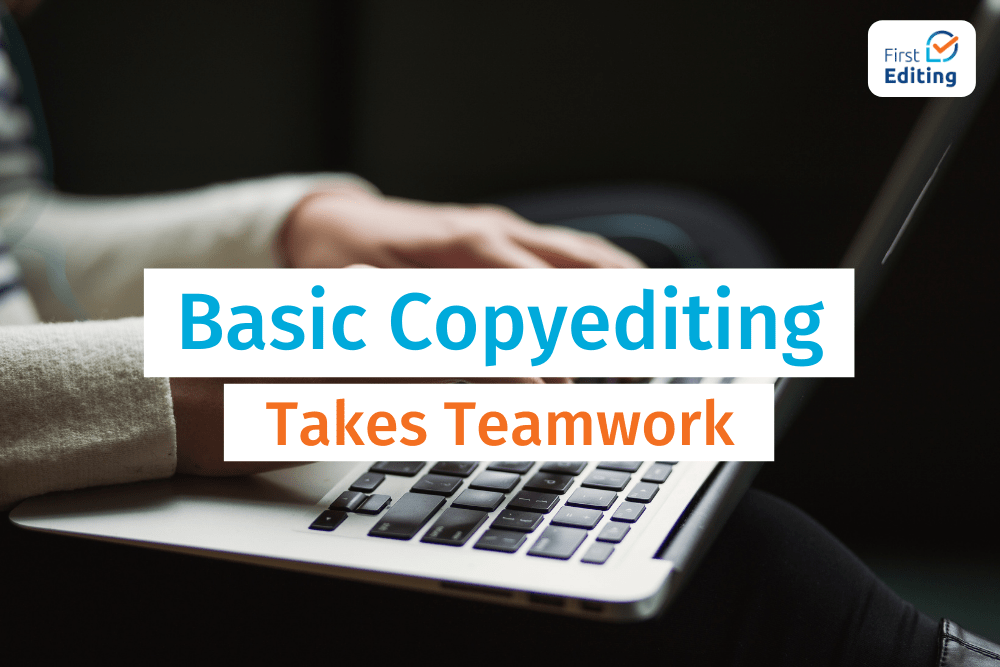Only when a writer and editor work together can copy-editing be truly successful.
Basic copy-editing takes teamwork. A writer and editor must work hand-in-hand — even if they’re a continent away from each other.
There are two steps to any professional writing process.

The first step is the writing, and besides all the great things going on in her head, the writer needs to help herself here. Whether it’s a dissertation, a manuscript, or even just a business letter or web article, she has to have a plan in mind for what the finished product is going to look like.
Every writer should know the basics of language, spelling, and punctuation. But let’s face it, most of us need a little help now and then. How many who people who don’t edit for a living know the difference between that and which?
A great resource for writers who want quick grammar tips is the Grammar Girl (quickanddirtytips).
For the specifics of writing an academic paper or dissertation, a site that will tell you everything about MLA style is english.purdue.edu or MLA.
Find a quick and easy guide to punctuation can at EnglishPlus.
Using these resources can help a writer get a start on the basic editing of her dissertation, story, or business document. The writer uses her smarts, her imagination, her talent, and all the great resources she can find on the web.
But eventually, a writer—even the best—needs some basic editing help.
And that’s where step two comes in. The writer has done everything she can, taken her project 90 percent to its finish. Now it’s time to bring in an editor.
One way to get good, professional editing that isn’t going to break the bank is to contact professional editors at FirstEditing.com. First Editing editors have experiences in everything from lengthy book manuscripts, to dissertations, to articles, ad copy, blogs—you name it, they can edit it.
And that’s when the teamwork starts. It’s not enough to submit your work to an editor and say, “I want this edited.” Sure, you will get basic editing. But you want something more. It’s your writing, your work. You want to be sure that it’s handled with care.
Professional editors like those at First Editing will listen to a client’s concerns and make sure whatever it is that’s being edited comes out the way the writer wanted it.
Don’t be afraid to make your wishes known. Editors love to know what a writer wants—the more input, the better.
You, as a writer, have worked hard on your project. You’ve thought it out, written it, and checked out grammar and punctuation websites. And you’ve decided to take it to that next level by having it professionally edited.
So don’t let your efforts stop there. The editor is working for you. Let your professional editor know what you want, and make a move from basic editing to a true professional collaboration that will make you shine as the great writer that you are.
Basic copy-editing requires teamwork. Only when the writer and editor work together can copy-editing succeed. A writer and editor must work hand-in-hand to confirm the final product is as polished and well written as possible.
There are two more crucial steps to any literary, academic, or business writing effort.
The first step is the writing itself. The writer must take all of the ideas in his or her head and get them on paper or a computer. Regardless of whether the finished product is a dissertation, a manuscript, or a business letter or blog post, the writer must think about and put into words the way the final product must sound to make sense.
Every writer should know the specifics of grammar, spelling, and punctuation. But let’s face it; most of us need a little help with those skills at times.

Utilizing online resources can help a writer improve the grammar and spelling of his or her dissertation, story, or business project. Great writers make use of their smarts, imagination, talent, and all of the great resources they can discover on the net.
But ultimately, a writer needs some basic copyediting and proofreading.
And that is exactly where step two comes in. The writer has done her best and gotten her project nearly completed. Now it is time to bring in an editor.
And that is when the teamwork starts. It is not sufficient to submit your job to the editor and say “I want this edited.” Indeed, you will receive basic copyediting. You will likely want much more than that. It is your creation, your baby. You want to be certain it receives the greatest attention to detail from the editor.
Specialized editors like those at FirstEditing.com will listen to a client’s concerns and provide support to make sure that the completed, edited document is what the client wants and needs. Writers should not hesitate to make their needs known. Editors like to understand what a writer wants—the more specifics that an author gives to his or her editor, the better that editor can perfect the writing.
You have worked hard on your project. And you’ve shown the determination to take it to the next level by having your work professionally edited.
So don’t let your efforts stop there. The editor is working for you. Let your editor know what you want, and make a move from standard editing to an actual expert collaboration that will get you to shine as the great author that you are.
When you request editing levels such as Level 2 – Technical Editing, Level 3 – Content Editing, and Level 4 – Executive Content Editing, you will receive much more than basic editing. We can help to make your writing shine!


















